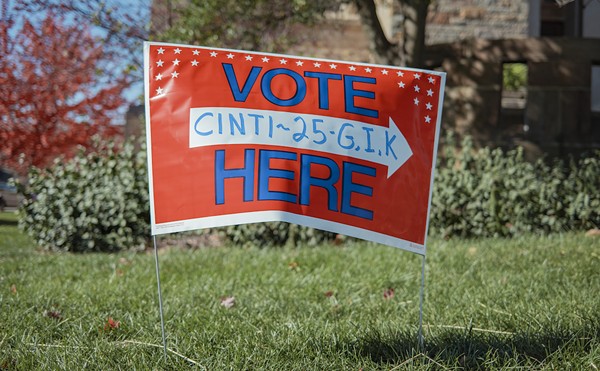Hamilton County has one of the most useful court Web sites in Ohio. Citizens can check upcoming court dates or the status of traffic tickets and even read electronic scans of actual court documents — all without leaving their homes.
Jim Cissell, Hamilton County Clerk of Courts since 1992, has been on the leading edge of this movement toward the Web — so much so that his office's site is www.courtclerk.org.
But Ohio Rep. Steve Driehaus, D-Cincinnati, says Cissell went too far too quickly. Driehaus is concerned that Cissell's site and other county court sites in Ohio make it easy for thieves to use citizens' bank account numbers, social security numbers and other information for fraud and theft — an old crime now often referred to as "identity theft."
"I really think he's just gone overboard with his site," Driehaus said.
That's a vast oversimplification, according to Cissell. State law requires certain county court records to include this personal information. For example, divorce records must have detailed financial statements with account numbers and balances. Many other court documents include social security numbers — key information for someone who wants to pose as someone else.
All this is nothing new; for years these records have been kept at county courthouses, but only on paper.
Although Dreihaus understands the value of Cissell's Web site, he says no one forced Cissell to post everything online.
"(Cissell) should have done it right the first time," Driehaus said.
Cissell's office has been scanning documents for in-house use since 1994 and posting them online since 1999. The transition to the Internet was easy and cost only about $20,000, Cissell says, but it's saved citizens hours of travel time and other inconvenience. Police can look up restraining orders at 3 a.m. to settle a domestic dispute. Disabled people can research cases without negotiating the Hamilton County Courthouse. Soon lawyers and others will be able to file documents electronically.
Today, at least 25 of Ohio's 88 counties post some court records online, according to Terri Mazur, president of the Ohio Clerk of Courts Association and Greene County clerk of courts. And that doesn't include the hundreds of city courts all over the state.
The Federal Trade Commission (FTC) received more than 86,000 identity theft complaints last year compared to 30,000 or so the year before, according to Betsy Broder, a spokesperson in the FTC's Bureau of Consumer Protection. Broder didn't know how many cases began with public records.
"We're seeing it in all ways," said Broder, adding that only about 20 percent of the victims know how thieves found the personal information.
Other common scams include asking people to claim prizes by submitting personal information or stealing business records in bulk from companies. The latter recently happened to Prudential Insurance, Broder said.
Driehaus presented his solution in front of the Hamilton County Commission during its April 10 meeting in the form of an amendment to Ohio Senate Bill 8, which regulates unsolicited e-mail ads. His attachment would require Ohio clerks of court to edit out several types of personal information before posting records online, including:
· Social security, credit card and bank account numbers or "any other personal financial information about an individual";
· The name, date of birth, age, address or telephone number "or other information concerning a minor";
· Psychiatric or psychological information about an individual;
· And information about any type of health, life, car or property insurance.
Driehaus said it will be "easy enough" for the clerk's office to edit out the sensitive information. But Cissell says the language in Driehaus' proposal is too broad, such as "psychological information." Court records are full of records this exemption could apply to.
"It shuts us down, basically," Cissell said.
In an unusually blunt speech during the April 10 county commission meeting, Cissell criticized Driehaus for not making a serious attempt to consult the clerk's office before proposing a fix. Driehaus responded by saying he introduced the proposal for discussion, not to force a quick vote.
Cissell said he's been concerned about this issue for several years, but Driehaus' fears are unjustified.
"Since we've been on the Web, we've received virtually none of these complaints," Cissell said.
Mazur chose not to post documents with social security numbers. But her biggest problem isn't identity theft — it's identity confusion. People with similar names often have their credit histories and sometimes their criminal backgrounds mixed up.
While Driehaus says there's never a good reason to post social security numbers online, Cissell says there are people who want theirs posted online with sworn affidavits. This allows banks and mortgage companies to verify they're loaning to the Jim Smith with the good credit and not the Smith with bad credit.
Driehaus admits it will "take some time" to remove social security numbers and other information from current records.
"Where the money comes from to do that, I'm not sure," Driehaus said.
But he doesn't believe his bill is an "unfunded mandate" — meaning a state bill with new requirements but no money to carry them out. Cissell should have thought about what he was doing before he did it, so this is his problem to resolve, Driehaus says. Cissell disagrees.
"I don't think I brought anything on myself," said Cissell, adding that he doesn't have the staff to carry out Driehaus' proposal.
Cissell says every advance in technology — from cars to telephones — includes complications. But that doesn't mean we should abandon them.
"The problem isn't as big as some people are trying to portray it," Cissell said.
A key sticking point is that Cissell doesn't want to be the judge of which documents should be posted online. That's the responsibility of the courts. People who want their records sealed can ask a judge to do so, he said.
Cissell does hope this year, however, to have some sort of recommendation on how to balance privacy rights with public access. Sealing juvenile court transcripts seems to be one possibility. And he did remove social security numbers from a relatively new online database of traffic tickets but doesn't favor combing through individual documents for them.
The issue is also being tackled by a new subcommittee of the Ohio Supreme Court's Advisory Committee on Technology for the Courts, which is headed by Franklin County Common Pleas Judge John Bessey.
"We need to get something going rather quickly," said Bessey, adding he hoped to finish recommendations in a year. This effort could produce a standardized system that all Ohio clerks of court could adopt.
While Driehaus blames court Web sites, legislators should remember something: Identity theft would be much more difficult if credit card companies didn't hand out credit like it was candy and if there was some added layer of security — such as a personal, ATM-like password — to online or telephone credit card purchases.
To report an identity theft, call the Federal Trade Commission at 877-ID-THEFT(877-438-4338) or visit www.consumer.gov/idtheft. To review your credit report, call one of these three major credit agencies: Equifax at 800-525-6285, Experian at 888-397-3742 or Trans Union at 800-680-7289.





